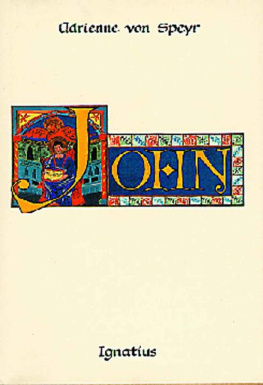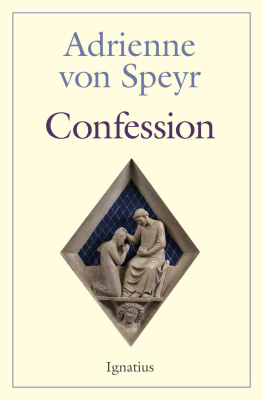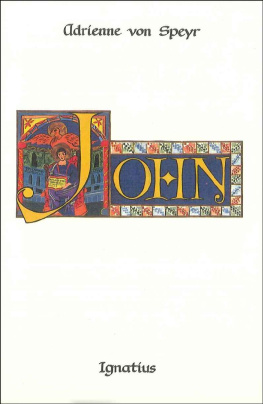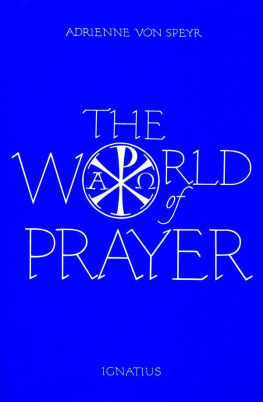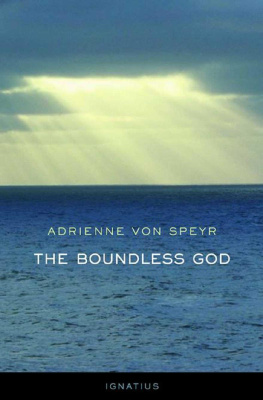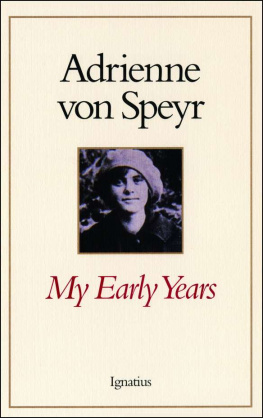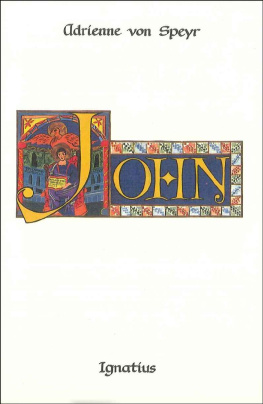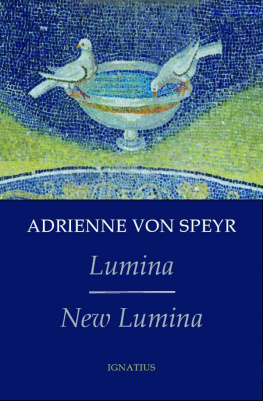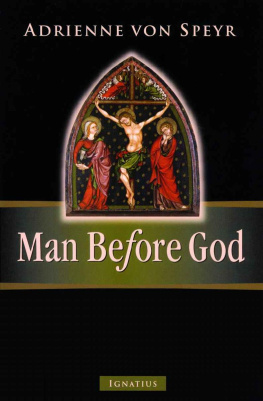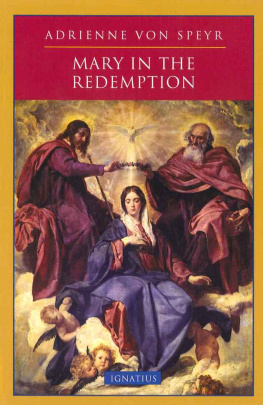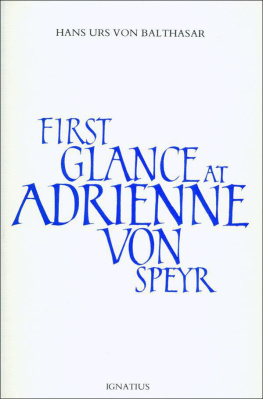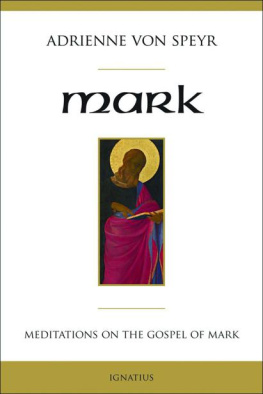Adrienne von Speyr - The Word Becomes Flesh: Meditations on John 1-5: Vol 1
Here you can read online Adrienne von Speyr - The Word Becomes Flesh: Meditations on John 1-5: Vol 1 full text of the book (entire story) in english for free. Download pdf and epub, get meaning, cover and reviews about this ebook. year: 2006, publisher: Ignatius Press, genre: Religion. Description of the work, (preface) as well as reviews are available. Best literature library LitArk.com created for fans of good reading and offers a wide selection of genres:
Romance novel
Science fiction
Adventure
Detective
Science
History
Home and family
Prose
Art
Politics
Computer
Non-fiction
Religion
Business
Children
Humor
Choose a favorite category and find really read worthwhile books. Enjoy immersion in the world of imagination, feel the emotions of the characters or learn something new for yourself, make an fascinating discovery.
- Book:The Word Becomes Flesh: Meditations on John 1-5: Vol 1
- Author:
- Publisher:Ignatius Press
- Genre:
- Year:2006
- Rating:5 / 5
- Favourites:Add to favourites
- Your mark:
- 100
- 1
- 2
- 3
- 4
- 5
The Word Becomes Flesh: Meditations on John 1-5: Vol 1: summary, description and annotation
We offer to read an annotation, description, summary or preface (depends on what the author of the book "The Word Becomes Flesh: Meditations on John 1-5: Vol 1" wrote himself). If you haven't found the necessary information about the book — write in the comments, we will try to find it.
Adrienne von Speyr: author's other books
Who wrote The Word Becomes Flesh: Meditations on John 1-5: Vol 1? Find out the surname, the name of the author of the book and a list of all author's works by series.
The Word Becomes Flesh: Meditations on John 1-5: Vol 1 — read online for free the complete book (whole text) full work
Below is the text of the book, divided by pages. System saving the place of the last page read, allows you to conveniently read the book "The Word Becomes Flesh: Meditations on John 1-5: Vol 1" online for free, without having to search again every time where you left off. Put a bookmark, and you can go to the page where you finished reading at any time.
Font size:
Interval:
Bookmark:
THE WORD BECOMES FLESH
ADRIENNE VON SPEYR
BECOMES FLESH
Meditations on John 1-5
Translated by Sr. Lucia Wiedenhver, O.C.D.
and Alexander Dru
IGNATIUS PRESS SAN FRANCISCO
Title of the German original:
Das Wort wird Fleisch
Betrachtungen ber das Johannesevangelmm Kapitel 1-5
1949 Johannes Verlag, Einsiedeln
Published with ecclesiastical approval
Commentary on John 1:1-8 was
previously published by Collins in 1953 as
The Word: Meditation on the Prologue of Johns Gospel .
Translated by Alexander Dru.
Reprinted with permission of
HarperCollins Publishers, London.
Commentary on John 1:19-5:47
translated by Sister Lucia Wiedenhver, O.C.D.
Cover by Victoria Hoke Lane
1994 Ignatius Press, San Francisco
All rights reserved
ISBN 978-0-87870-411-2
Library of Congress catalogue number 93-78200
Printed in the United States of America
The characteristic quality of the Apostle John is most clearly seen where the natural and supernatural have become united in him and keep breaking forth from this unity to form it anew, interpret it, and allow other believers to participate in it in a way that calls into service all that is natural and supernatural in them. John is the disciple whom the Lord loves, with a supernatural, Christian and divine love, but equally a really human love. John experiences the Son of God as his Lord and friend, and all that is human and belongs to friendship in the Lord opens for John perspectives of the supernatural, the divine, of the love of the Son for the Father, of the triune God. The Lord as well as John use this human love to throw light on divine love, to explain how the Father loved men when he created them, how he loves them when he sends the Son, to such a degree that he teaches them to love through his own love.
The Lord is friend to John and also God. John recognizes the divine in the friend, and the friend in the divine. The Lord uses this friendship to open John in all directions and give him the deepest insight into the love of God a man has ever received. But since this insight can constantly flow from friendship, there is no danger that it may at any moment become merely intellectual, exaggerated or strange. It keeps its naturalness even in the most sublime raptures, something of the naturalness Adam possessed before the fall in his relationship with God. An unerring sureness about what God desires and what he avoids, an enablement to grow ever deeper into his will and his love. A wholeness that allows the disciple to experience the most supernatural things in the most natural way, to feel always perfectly at home in the place that is his in the Lords love, and from there to do out of love all that love shows and reveals to him,
John is something like a son to the Lord. He obeys him as a son obeys his Father, he allows himself to be instructed, he knows no greater joy than to be with his Father and to show him his love, and it comes equally natural to him to receive the Fathers love. John experiences this love as a gift of grace that contains in itself the demand for his whole life. He follows; he will stand beneath the Cross; he will outlive the Lord and experience the vision of Revelation. But he is not concerned with the borderline between the joy of this love and its strict demand, because he has given all his love forever to the Lord and because he knows that the Lords answer, whatever it may be, will always and at every cost be an answer of loveeven if it should lead him into landscapes that hardly appear human. The bracket of love is forever closed around these two; the most extreme, the darkest, and most incomprehensible that could happen will always take place within this bracket. John is like a son to the Lord in this: in his boundless trust and in that the questions he asks him have no need to touch on this essential reality, which is always already his from the Lord, who keeps him in it.
When God the Father gave Eve to Adam, he gave him a companion, a helpmate in love, a kind of second self. John can never be the alter ego of the Lord because he is not God, but he is in a certain sense a companion, a helpmate to the Lord, a partner, his ear, something like the translation of his thoughts. In his love for the disciple the Lord can always try out how far a man can meet, understand, assimilate the divine in the incarnate Son, how far he can use it in order to grow in love. John becomes a test case for the Lord, an experiment, but entirely in love. Apart from his Mother, no one perhaps has understood the Incarnation better than John, because the naturalness of love is so great in him. He loves God the Father also because he has given him a friend in his Son. Not only a model, not only a master, not only a Lord and God, but a close friend. Not only a lord, but a brother. Not only one who in all things surpasses him, but also one with whom he can share everything in simplicity of heart. He loves the Son, from whom he learns how to work for God but also how one rests in God, how one adores God and how one loves the neighbor, how one receives faith from God and also how one gives this faith to God with thanksgiving, even how one receives the gift of the Son from the Fathers hands and how one gives the Son back to the Father in the bitter hour of the Cross.
There is, of course, also for John a way, a development, a guidance, because every meeting with the Lord mediates new insights and new outlooks. Yet it is not really a development, for John has given everything already in the first hour in unconditional love. When he was about to call fire down on Samaria, he did it because there was already an absolute knowledge of the power God gives to those who believe. Already then he did not need this test in order to believe. But the question whether to call fire down from heaven can be asked quite naively, for John is quite sure that he has power over the fire in the Lords love. Did the Lord not say that faith moves mountains? When the mother of the sons of Zebedee asks the Lord to place her sons at his right hand and his left in his Kingdom, John in his childlike relationship with the Lord is not wholly innocent of this. If a father has ten children and wants to go for a walk with them, all would like to hold his hand, but he can give his hand to only two of them. And insofar as John is very close to the Lord, the mothers petition is also his own. But he does not make it himself and has no need of doing so. The Lords reply is addressed to him: Can you drink the chalice? John is human, even in his sanctity; he must be stretched by the Lord. His reply comes unhesitatingly: We can. From his lips this is not presumption. It is a reply of love. It is the conformity to the Lord to which he is accustomed every day. One does what the Lord does, what he wants and demands; there are no problems. Every question has already found its solution in the grace of the Lords love.
A child has no problems either when the mother is present and deals with all the difficulties. We can, says love, and in deepest faith; it is also a blind faith. It sounds childlike, perhaps even comical to the outsider. But it is the answer of surrender. John will simply go with the Lord, without asking questions. To the Last Supper, to the Cross, to the reception of the Mother of the Lord, to the Acts of the Apostles, to the mission of the Gospel, and to the Letters. To the painful difficulties about which the third Letter allows us to guess. It is a constant progression and enlargement to ever-new missions. The last task, the Apocalypse [Revelation], reveals that at that time John had been truly placed by the Lord into his particular mode of being, his own outline. He can drink the chalice. The word that looked like an exaggeration has, unknown to himself, revealed what he is: his human and eternal intrinsic being, given by the eternal being of the Son, given with such superabundance that he can already bear today, as earthly man, the mysteries of heaven that the Lord unlocks for him. He can do it because it is thus the Lord needs him. He disposes of John in such a way that he can communicate to him the mysteries of heaven also in this form. John needs to know this from the beginning. Of himself he could not have any access to it. He experiences all this through the grace of the Lords love. His personal love for the Lord, which he is the only one to stress in the Gospel, makes it possible for him more than others to return after the vision of the Apocalypse into the narrow boundaries of human life, asking no place other than the one held by the rest of the Apostles and evangelists.
Next pageFont size:
Interval:
Bookmark:
Similar books «The Word Becomes Flesh: Meditations on John 1-5: Vol 1»
Look at similar books to The Word Becomes Flesh: Meditations on John 1-5: Vol 1. We have selected literature similar in name and meaning in the hope of providing readers with more options to find new, interesting, not yet read works.
Discussion, reviews of the book The Word Becomes Flesh: Meditations on John 1-5: Vol 1 and just readers' own opinions. Leave your comments, write what you think about the work, its meaning or the main characters. Specify what exactly you liked and what you didn't like, and why you think so.

